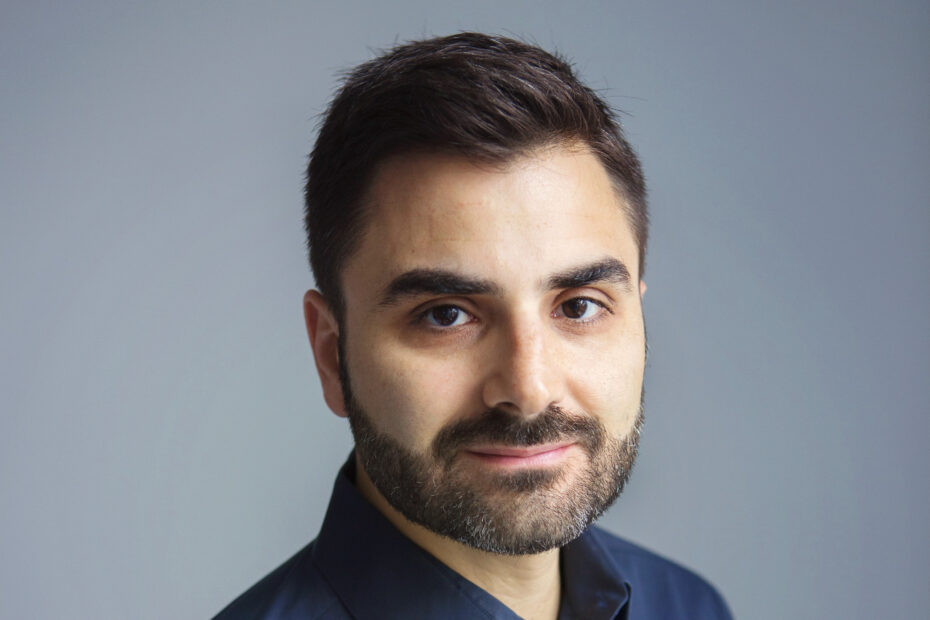Since 2013, Principal and Vice-Chancellor, Suzanne Fortier, has honoured 21 of McGill’s most talented and accomplished early-career researchers with the prestigious Prize for Outstanding Emerging Researchers. This year, three up-and-coming research stars – Professors Jonathan Afilalo, Agus P. Sasmito and Anna Weinberg – have joined their ranks.
“For the eighth year in a row, McGill has the great honour of awarding this prestigious distinction to three highly accomplished early career researchers,” said Principal Suzanne Fortier. “I am pleased to have the opportunity to recognize Professors Afilalo, Sasmito and Weinberg for their exceptional contributions and ground-breaking research. I extend my sincerest congratulations to them for continued success!”
Administered by Research and Innovation, the prize, which includes a monetary award, honours researchers across all disciplines. McGill awards up to three prizes annually. Professor Agus P. Sasmito was honoured at the Engineering virtual Convocation Ceremony on June 10, Dr. Jonathan Afilalo was honoured at the Health Sciences virtual ceremony on June 10, and Professor Anna Weinberg was honoured at the Faculty of Science virtual Convocation Ceremony on June 11.
Jonathan Afilalo: Fundamentally changing how cardiologists approach older patients
“It is much more important to know what sort of a patient has a disease than what sort of a disease a patient has” – Dr. William Osler.
In Canada and around the world, people over the age of eighty are disproportionately afflicted by cardiovascular disease – and yet, there is little evidence to inform the care of these challenging and often complex patients.
Dr. Jonathan Afilalo’s research and clinical approach has fundamentally changed how cardiologists treat geriatric patients. As one of the first cardiologists to recognize the importance of frailty – a multifaceted syndrome of reduced resiliency – in this field, Afilalo’s career emphasizes that frailty is a major determinant of cardiovascular outcomes and that it should be studied with rigour. Prior to his work, frailty was a concept that rested in the domain of geriatric practitioners.
Developing digital tools to facilitate clinical assessments

Afilalo has led the way in growing an entire branch of cardiology around the concept, and that has led to improved tools to measure what is now recognized to be a fundamental risk factor in cardiovascular medicine and surgery.
He led the FRAILTY-AVR study, which studied older patients across 14 centres in three countries and created the ‘Essential Frailty Toolset’. This toolset permits more efficient quantification of frailty and predicts patient-centered outcomes. He was awarded a knowledge translation grant from the Canadian Frailty Network to turn this tool into a mobile app called ‘Frailty Tool,’ which is now one of the most downloaded apps in the field.
Afilalo also created an open source webapp called ‘CoreSlicer.com,’ which has opened the door to easily measure muscle mass and diagnose sarcopenia – a condition characterized by loss of skeletal muscle mass and strength commonly afflicting older adults – using clinical CT images. He is now leading the PERFORM-TAVR trial, which is seeking to reverse sarcopenia and frailty to optimize functional recovery after cardiac procedures.
A pioneer in the emerging field of Geriatric Cardiology
Afilalo has received numerous awards and research grants to support his work and has published more than 130 peer-reviewed papers. Afilalo was also invited as visiting professor to Johns Hopkins Hospital in 2020 and as keynote speaker at conferences in Denmark, Germany, and Spain.
He sits on the Leadership Council of the American College of Cardiology’s Geriatric Cardiology Section, which is the largest professional organization in the world dedicated to the advancement of care for geriatric patients with cardiovascular disease.
Mentoring the next generation of cardiologists
To educate the broader cardiovascular community on his research and clinical approach, Afilalo founded and is the Director of Canada’s very first Geriatric Cardiology Fellowship Program at McGill, which trains the next generation of residents and fellows to provide patient-centered care to older patients with cardiovascular disease.
The advances in the field of cardiology through Afilalo’s research holds significant potential to help patients, their families and the healthcare systems cope with the changing demographics and clinical characteristics of those afflicted by various cardiovascular diseases.
Agus P. Sasmito: Working toward a more sustainable and responsible mining industry
“I’m honoured and thrilled to receive such a prestigious award, which motivates me to contribute more to the University, to knowledge and to society,” said Professor Agus P. Sasmito. “This award is special, as it is in conjunction with McGill’s 200th anniversary and also the 150th anniversary of our Mining Engineering Department, the oldest, and one of the most highly ranked, mining schools in North America. I would like to thank my family, mentors, collaborators and students who have been continuously supporting me – some of the credits should go to them as well.”

High grade ore deposits – a natural concentration of one or more minerals within a host rock – in the Earth’s surface have been mined since the Prehistoric Period, and are now depleted. This has motivated the mining industry to delve deeper underground, or to mine in remote locations such as the Arctic, the seabed or even in space. Mining in such difficult locations creates challenges, such as high energy consumption and carbon emission.
Sasmito focuses include mine ventilation, heating and cooling, artificial ground freezing, slurry and paste transportation, as well as microwave irradiation for rock preconditioning – the process of reducing the strength of a rock. His research reinforces traditional mining knowledge with advanced multiphysics systems, spanning science and engineering disciplines, to develop cutting edge technologies for sustainable mining, minerals and energy extractions.
“The ultimate goal of my research is to fully decarbonize the mining industry by implementation of hybrid renewable energy solutions for mine electricity, motive (mining fleets) and thermal (heating/cooling),” said Sasmito.
These efforts could significantly transform Canada’s fossil fuel dominated mining into a green mining industry, and possibly result in Canada becoming a global leader in sustainable engineering.
The potential to save significant costs, energy and carbon emissions
Sasmito’s development of rock thermal energy storage solutions has been particularly significant in reducing energy consumption and fighting climate change: from renewable heating in Arctic mines, to spray-freezing with cold storage for renewable air heating and cooling in ultra-deep mines.
“I am collaborating with colleagues to understand the impact of climate change to mines in the Arctic and develop sustainable technology for mitigation and adaptation to climate change,” says Sasmito.
His research group is developing renewable cold energy storage technology, and critical infrastructures, to protect permafrost ground from thawing due to climate change in northern mines. In addition to this work, Sasmito is also a part of a bigger group that is now developing the next generation of mining machines for continuous extraction of hardrock, which are ‘hard’ minerals containing metals, such as ore containing gold, silver, iron, copper, zinc, nickel, tin, and lead.
“There is an old saying that everything that is not grown is mined. However, some people see mining as a ‘black sheep’ in our industries. At McGill Mining, we work with industry and help them to transform into a more sustainable and responsible industry,” said Sasmito. “We also help the industry to tackle the challenges and develop new technology so that our industry remains competitive. I hope that with my expertise in advanced multiphysics systems for sustainable minerals and energy extraction, I can help mining operations become more sustainable. This is very well aligned with the government vision to achieve net-zero carbon emission by 2050.”
A highly productive leader in mining research
Sasmito consistently maintains a high-quality and high-impact level of research. He has published 130 journal papers (92 over the last six years). He has also published his work in 51 conference proceedings, for a total 92 papers, four book chapters, and edited one book. The papers, book and book chapters attracted more than 3000 citations in the past six years.
In recognition of Sasmito’s contributions and leadership in mining research, the Canadian Institute of Mining, Metallurgy and Petroleum awarded him the 2019 CIM-Bedford Canadian Young Mining Leaders Award for exceptional achievement and potential of young Canadian mining leaders.
In addition to his productive research and professional activities, Professor Sasmito has trained more than 30 graduate and 20 undergraduate research students as well as four postdoctoral fellows.
Anna Weinberg: Unlocking the developmental origins of depression and anxiety
“It’s a tremendous honour to have been awarded this prize.”

Anxiety and depression are two conditions which are complex, both in their symptomology and treatment. Professor Anna Weinberg’s research is equally complex, involving laboratory-based methods, multiple physiological measures, advanced neuroimaging techniques, and a lifespan-developmental approach. Her research sheds light on the effects of familial vulnerability and life-stress on neural functioning from infancy through to adulthood to predict mental illness. She also explores the ways in which these vulnerabilities interact with the environment to predict mental illness.
“I study how the brain processes rewards and threats across the lifespan – from infancy to adulthood – and what experiences force adaptations in the neural systems that process rewards and threats,” says Weinberg.
Her research focuses on three main areas: identifying neural abnormalities that can be used to predict who is at risk for anxiety and depression; identifying how stress and trauma might contribute to these neural deficits; and identifying environmental and interpersonal processes that interact with neural abnormalities to accelerate the transition to disease.
Weinberg also examines the combined effects of maternal depression, gestational stress, and parenting behaviours on neural functioning. For this research, she works with infants and their mothers. This patient group can help specify unique and interacting biological and environmental contributions to the origins of anxiety and depression across infant development.
Her research has increased scientific understanding of the roots of depression and anxiety, and it holds promise for future applications that can reduce the prevalence of these costly mental health diseases.
A leader in the field of Psychophysiology
Weinberg has published 71 peer-reviewed articles and six chapters, and her work has been cited more than 5,000 times. Her publications often appear in top psychopathology and neuroscience journals.
Professor Weinberg has received multiple awards over the course of her career, including recognition as one of Psychology’s “Rising Stars” by the Association for Psychological Science in 2016. More recently, she was the recipient of the Early Career Award from the Society of Psychophysiological Research in 2020.
Studying the effects of COVID-19 stress on infants and early adolescents
Weinberg studies what kind of life experiences force adaptations in the neural systems that process rewards and threats. One such force is stress. Much of her research in the next few years will be looking at the effects of COVID-19 stress on the brain, particularly focusing on exposure to stress during two key periods of neural plasticity: infancy and early adolescence.
“We hope to understand when and how stress associated with the pandemic may have affected developing brains, as well as when and how these neural adaptations lead to psychopathology,” she explains. “We’re also hoping to do this by taking neuroscience out of the lab and into the real world, through the use of mobile EEG equipment.”
